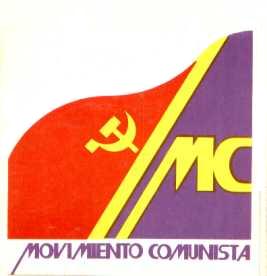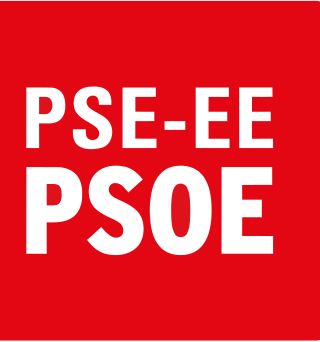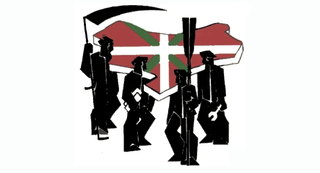Related Research Articles
Batasuna was a Basque nationalist political party. Based mainly in Spain, it was banned in 2003, after a court ruling declared proven that the party was financing ETA with public money.

Basque nationalism is a form of nationalism that asserts that Basques, an ethnic group indigenous to the western Pyrenees, are a nation and promotes the political unity of the Basques, today scattered between Spain and France. Since its inception in the late 19th century, Basque nationalism has included Basque independence movements.

Euskadiko Ezkerra was a Basque socialist political organisation. It was founded as a coalition of Euskal Iraultzarako Alderdia and other Basque Marxist forces in 1977 to present lists for the Spanish general elections in the constituencies of Vizcaya, Guipúzcoa and Álava, while Navarrese Left Union (UNAI), an allied coalition, was to present a list in the constituency of Navarre.
Abertzale is a Basque term usually referring to people or political groups who are associated with Basque nationalism.
Communist Party of the Basque Country, is the federation of the Communist Party of Spain (PCE) in Basque Country and Navarre.

Communist Movement was a political party in Spain. It was founded in 1972 as Movimiento Comunista de España (MCE).
Zutik was a political party in Basque Country, Spain which was dissolved in 2009. Zutik was formed in 1991 through the merger of the EMK and LKI—the Basque branch of LCR. Within Zutik there is a current affiliated to the United Secretariat of the Fourth International. Zutik had a branch in Navarre known as Batzarre.
Euskal Iraultzarako Alderdia or EIA was a Basque Country/Spanish political party between 1977 and 1982.

The Socialist Party of the Basque Country–Basque Country Left is a social-democratic political party in the Basque Country that acts as the regional affiliate of the Spanish Socialist Workers' Party (PSOE).
Batzarre is a political party in Navarre, Spain. It has a branch in the Basque Autonomous Community known as Zutik. It bids to win the political space to the left of the Basque nationalists and the Spanish socialists, the latter eroded for their long-running collusion with the conservative UPN government. It formed on 29 January 2011 the coalition Izquierda-Ezkerra along with Izquierda Unida de Navarra (IUN) and local Socialist figures disillusioned with the party's regional alliances.
The Basque National Liberation Movement was an umbrella term that comprised all social, political and armed organizations orbiting around the ideas of the illegal armed organisation Euskadi Ta Askatasuna (ETA), proscribed internationally as a terrorist organisation.

Eusko Alkartasuna is a Basque nationalist and social-democratic political party operating in Spain and France. The Basque language name means Basque Solidarity and abbreviated as EA. The party describes itself as a "Basque nationalist, democratic, popular, progressive and non-denominational party". The party has adopted the slogan "Euskal Sozialdemokrazia".

Revolutionary Communist League was a political party in Spain. It was founded in 1971 by members of the Catalan group Comunisme, a split of the Popular Liberation Front (FLP). The LCR had a trotskyist ideology, adopting more heterodox political positions in the 1980s.
Navarrese Left Union, better known by its acronym UNAI was an electoral coalition formed in 1977 to present a list in the first democratic elections in Spain since 1936 in the constituency of Navarre. UNAI was the sister coalition of Euskadiko Ezkerra, that presented lists in Gipuzkoa, Araba and Bizkaia.
Auzolan was a political coalition in the Southern Basque Country, created on 26 March 1983. It was a coalition between the Liga Komunista Iraultzailea (LKI), Langile Abertzale Iraultzaileen Alderdia and Nueva Izquierda, and had the support of the Communist Movement of Euskadi (EMK). The spokesperson of Auzolan was Bixente Serrano Izko.

Langile Abertzale Iraultzaileen Alderdia, was a Communist political party of the Southern Basque Country and Basque nationalist ideology that was born during the last years of the Francoist State as a result of a division of ETA. Its acronym, laia is also the Basque name of an agricultural tool.
Alternative Left was a Spanish political party with a socialist ideology formed by the union of the Revolutionary Communist League (LCR) and the Communist Movement (MC) in 1991.
Amaiur was a Navarrese political coalition with a socialist and Basque nationalist ideology formed by the union of Herri Batasuna (HB), Euskadiko Ezkerra (EE) and the Communist Movement of Euskadi (EMK) in 1979, to contest the Navarrese elections of that year. The coalition gained 7 seats in the Parliament of Navarre.
The Euskadiko Sozialisten Batasuna was a clandestine political movement in the Southern Basque Country, Spain, formed in 1959, and active under Francoist Spain. It was the Basque sister organization of the Spanish Popular Liberation Front (FELIPE) and the Catalan Workers' Front of Catalonia (FOC).
References
- ↑ Until 1983.
- ↑ 6 in the Basque Autonomous Community and 3 in Navarre.
- 1 2 «Euskadiko Mugimendu Komunista-Movimiento Comunista de Euskadi», Enciclopedia Vasca Auñamendi.
- ↑ Euskal Herriko Alderdi Sozialista, Langile Abertzale Iraultzaileen Alderdia, Euskal Iraultzarako Alderdia, Langile Abertzaleen Batzordeak, Langile Abertzale Komiteak, Carlist Party of Euskalherria, Organización Revolucionaria de los Trabajadores, Eusko Sozialistak, Eusko Komunistak, Party of Labour of Spain, Communist Unification Party, Liga Komunista Iraultzailea, Communist Left Organization and the Communist League.
- ↑ Leonisio Calvo, Rafael (2012). «Izquierda abertzale, de la heterogeneidad al monolitismo». III Congreso Internacional de Historia de Nuestro Tiempo. Logroño: Universidad de La Rioja. p. 385. ISBN 978-84-695-5155-4.
- ↑ (in Spanish) Por sus carteles los conoceréis , Aitor Guenaga Bidaurrazaga, 2 November 1991, El País .
- ↑ (in Basque and Spanish) EMK , KartelARTEAN, 7 October 2010.
- ↑ (in Basque and Spanish) EMK-REN BESTE KARTELA , KartelARTEAN, 16 February 2011.
- Merino, Javier (2009). «El espejismo revolucionario: la izquierda radical ante ETA», Cuadernos Bakeaz, núm. 94.